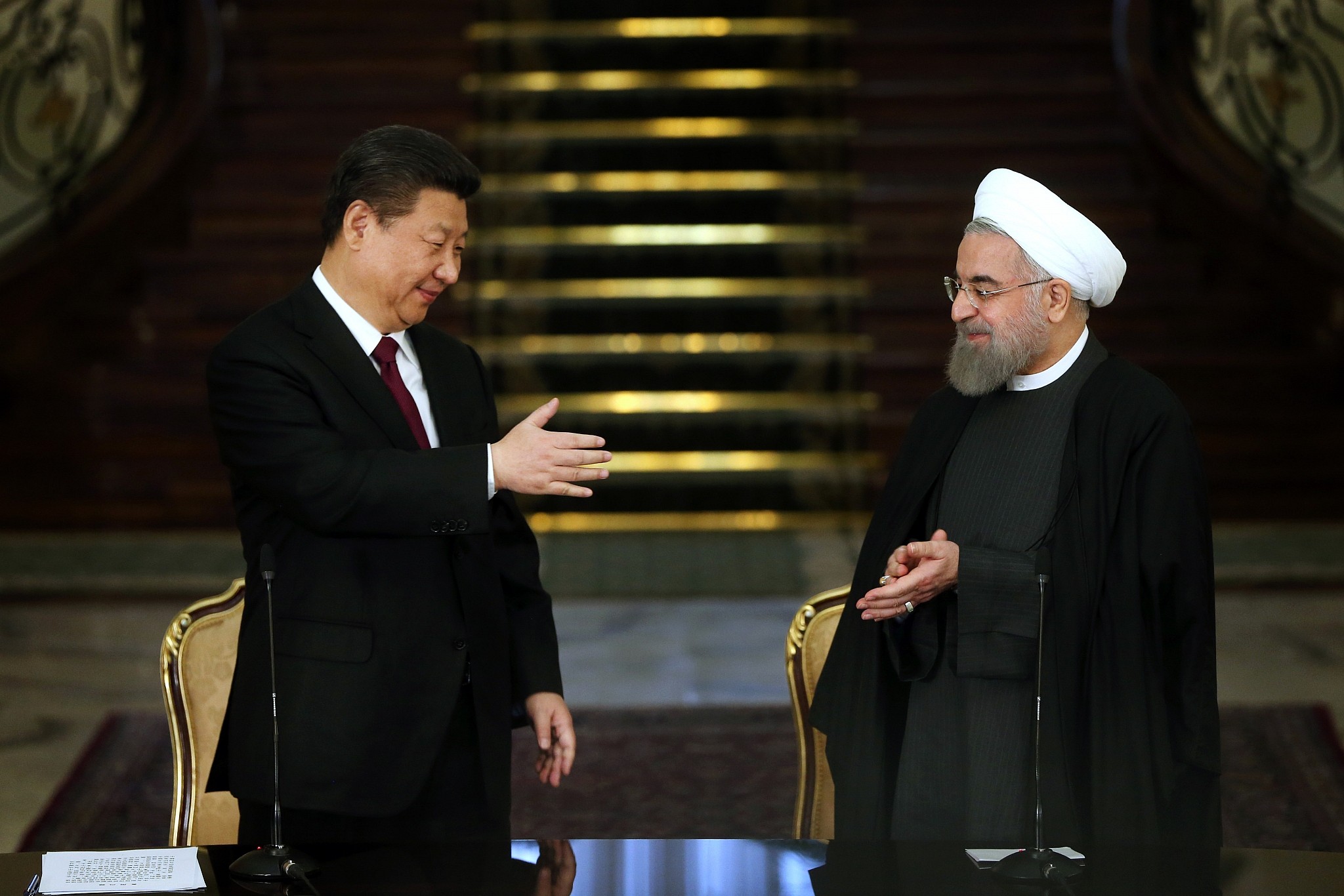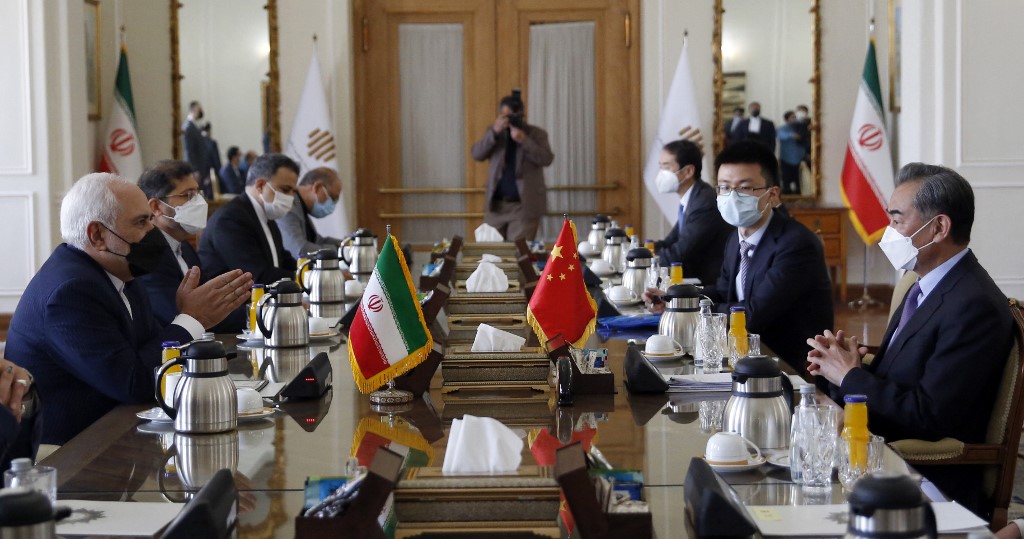- Beijing to invest $400 billion in Iran in exchange for oil, report says; agreement will strengthen military ties and may undermine US leverage in Middle East
Iran and China on Saturday signed a 25-year strategic cooperation agreement addressing economic issues amid crippling US sanctions on Tehran, according to Iranian state media.
The agreement, dubbed the Comprehensive Strategic Partnership, covers a variety of economic activity from oil and mining to promoting industrial activity in Iran, as well as transportation and agricultural collaborations, according to the report.
No additional details of the agreement were revealed as Iran’s Foreign Minister Mohammad Javad Zarif and Chinese counterpart Wang Yi took part in a ceremony marking the event.
The New York Times reported that China will invest some $400 billion in Iran in exchange for oil as part of the deal. The two countries will also step up military cooperation with joint training, research and intelligence sharing, the report said.
China is Iran’s leading trade partner and was one of the biggest buyers of Iranian oil before then US president Donald Trump reimposed sweeping unilateral sanctions in 2018 after abandoning a multilateral nuclear agreement with Tehran.
The deal signed Saturday could undermine US leverage over Iran ahead of expected negotiations and lessen American influence in the Middle East. Ongoing US sanctions against Iran could hamper its trade with China despite Saturday’s agreement, however.
The Times report said Iran was prepared to host direct talks between Israel and the Palestinians, further suggesting that US influence in the region could be waning.  Chinese President Xi Jinping, left, and his Iranian counterpart Hassan Rouhani prepare to shake hands at the conclusion of their joint press conference at the Saadabad Palace in Tehran, Iran, January 23, 2016. (Ebrahim Noroozi/AP)
Chinese President Xi Jinping, left, and his Iranian counterpart Hassan Rouhani prepare to shake hands at the conclusion of their joint press conference at the Saadabad Palace in Tehran, Iran, January 23, 2016. (Ebrahim Noroozi/AP)
“We believe this document can be very effective in deepening” Iran-China relations, Iran’s foreign ministry spokesman Saeed Khatibzadeh said, recalling that the pact had first been proposed during a visit to Tehran by Chinese President Xi Jinping in January 2016.
Xi and his Iranian counterpart Hassan Rouhani agreed then to establish a roadmap for “reciprocal investments in the fields of transport, ports, energy, industry and services.”
“Iran’s government and people are striving, as they always have, to broaden relations with trustworthy, independent countries like China,” supreme leader Ayatollah Ali Khamenei said at the time, describing the proposed cooperation agreement as “correct and reasonable.”
Xi has championed the Belt and Road Initiative, a plan to fund infrastructure projects and increase China’s sway overseas.
The deal with China marked the first time Iran has signed such a lengthy agreement with a major world power. In 2001, Iran and Russia signed a 10-year cooperation agreement, mainly in the nuclear field, that was lengthened to 20 years through two five-year extensions.
Before the ceremony Saturday, Yi met Rouhani and the special Iranian envoy in charge of the deal, Ali Larijani.
The deal also supports tourism and cultural exchanges and comes on the 50th anniversary of the establishment of diplomatic relations between China and Iran. The two countries have had warm relations and both took part in a joint naval exercise in 2019 with Russia in the northern Indian Ocean.
Reportedly, Iran and China have done some $20 billion in trade annually in recent years. That’s down from nearly $52 billion in 2014, however, because of a decline in oil prices and US sanctions imposed in 2018 after Trump pulled the US unilaterally out of Iran’s nuclear deal with world powers. Iranian Foreign Minister Mohammad Javad Zarif, left, meets with his Chinese counterpart Wang Yi, right, in the capital Tehran, on March 27, 2021. Iran and China signed what state television called a ’25-year strategic cooperation pact,’ as the US rivals move closer together. (AFP)
Iranian Foreign Minister Mohammad Javad Zarif, left, meets with his Chinese counterpart Wang Yi, right, in the capital Tehran, on March 27, 2021. Iran and China signed what state television called a ’25-year strategic cooperation pact,’ as the US rivals move closer together. (AFP)
Iran has since pulled away from restrictions imposed under the deal under those sanctions in order to put pressure on the other signatories — Germany, France, Britain, Russia and China — to provide new economic incentives to offset US sanctions. Iran is also believed to be maneuvering for leverage ahead of expected negotiations with the Biden administration.
The nuclear accord gave Iran relief from international sanctions in return for limits on its nuclear program, but after Trump took the US out of the deal Iran walked back its own commitments, including by enriching uranium past the accord’s limits and barring UN inspections of its nuclear facilities. A number of other world powers remain committed to the deal.
US President Joe Biden wants to negotiate tougher conditions for an agreement with Iran, including by limiting its missile production and destabilizing activities in the region. Iran has ruled out such talks and demands the US lift sanctions before it returns to compliance, putting the two sides at a stalemate.
A US official said Saturday that it doesn’t matter “who goes first” to return to compliance with the deal, suggesting Washington was softening its position in the standoff with Tehran.
Israeli officials, including Prime Minister Benjamin Netanyahu, have voiced opposition to the Biden administration’s desire to rejoin the deal, putting Jerusalem and Washington at odds on the issue. Some leading Israeli officials in recent months have warned of military action to halt Iran’s nuclear program.
Nonetheless, Israeli and US officials agreed to set up a joint team for sharing intelligence about Iran’s nuclear program during recent strategic talks, according to a report last week.





